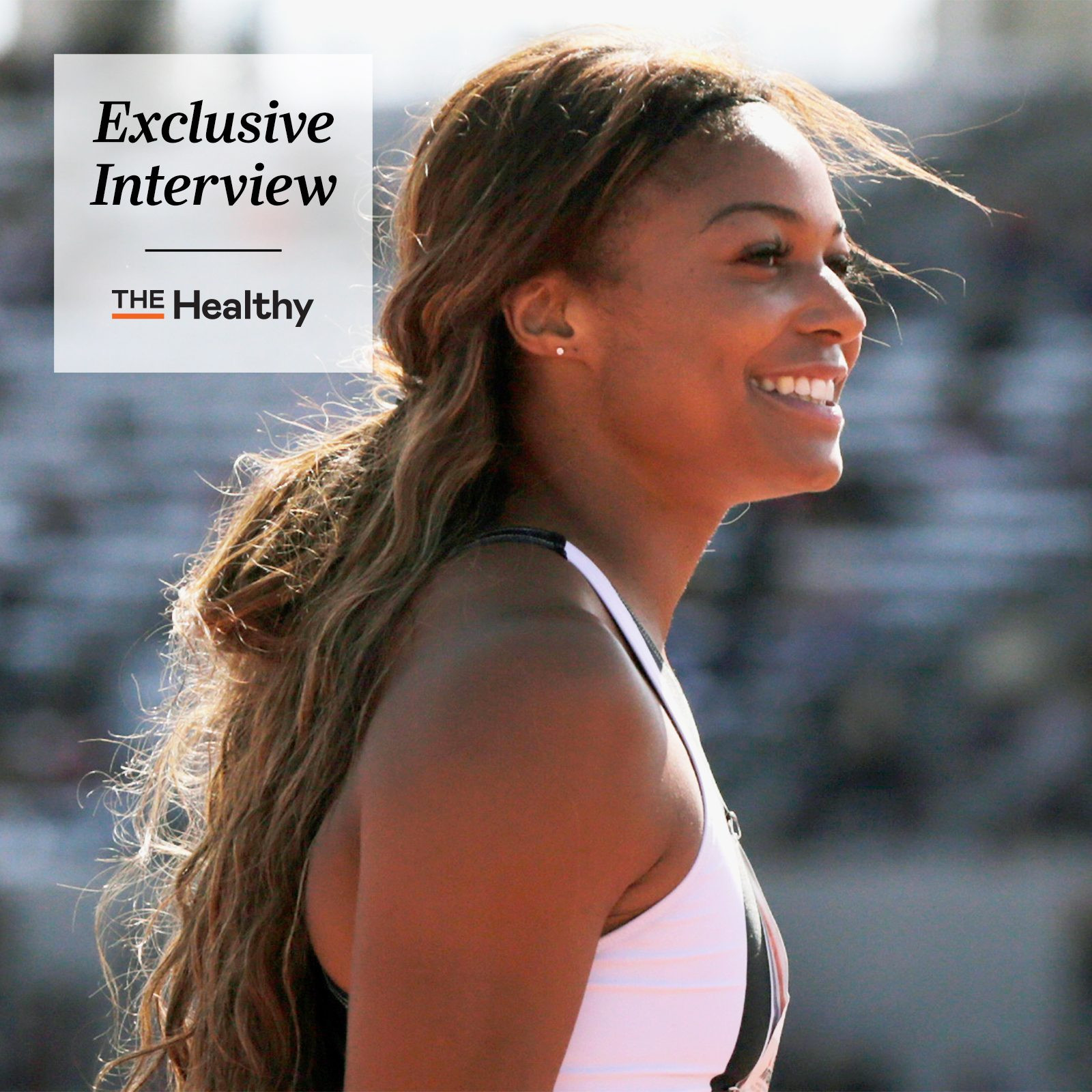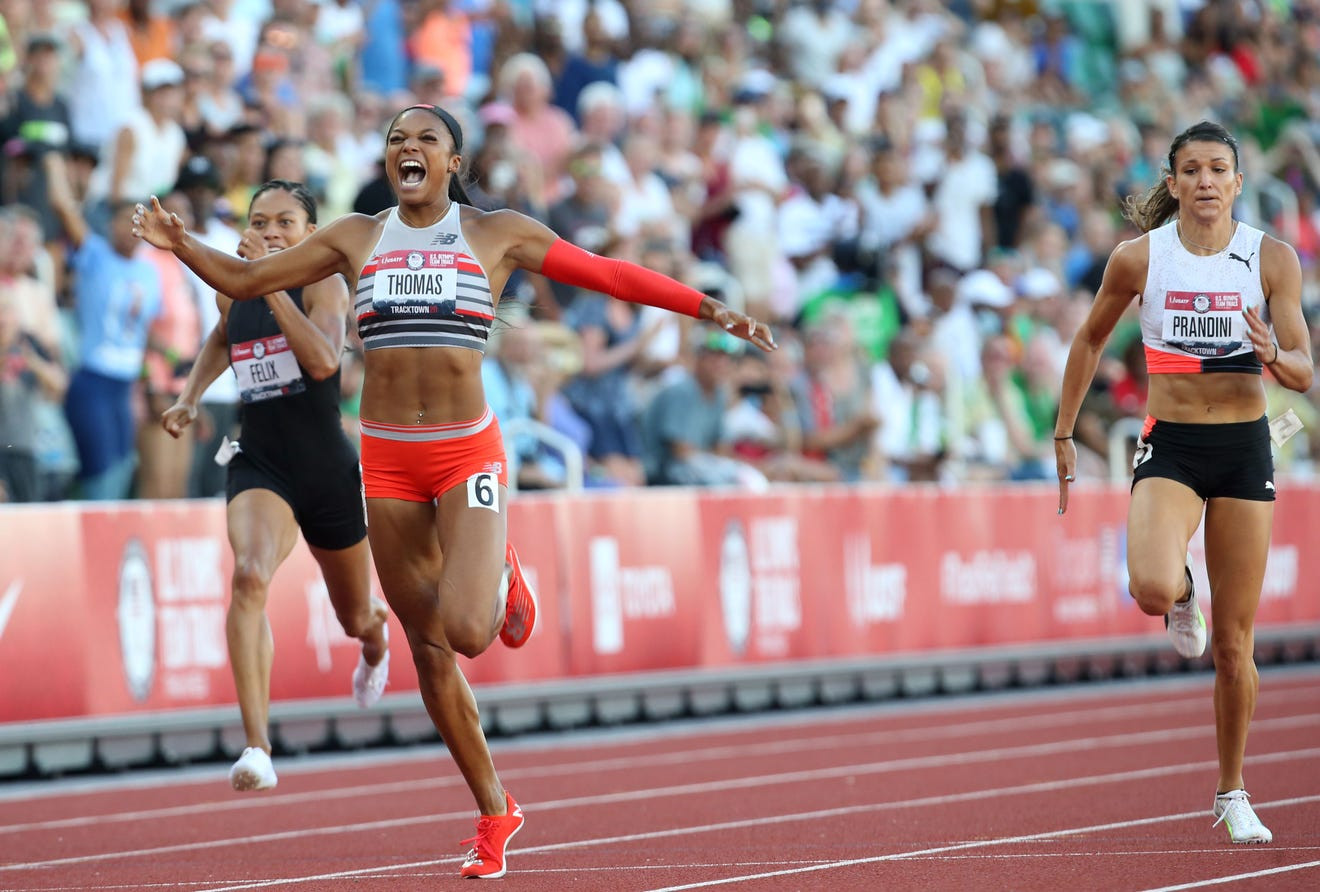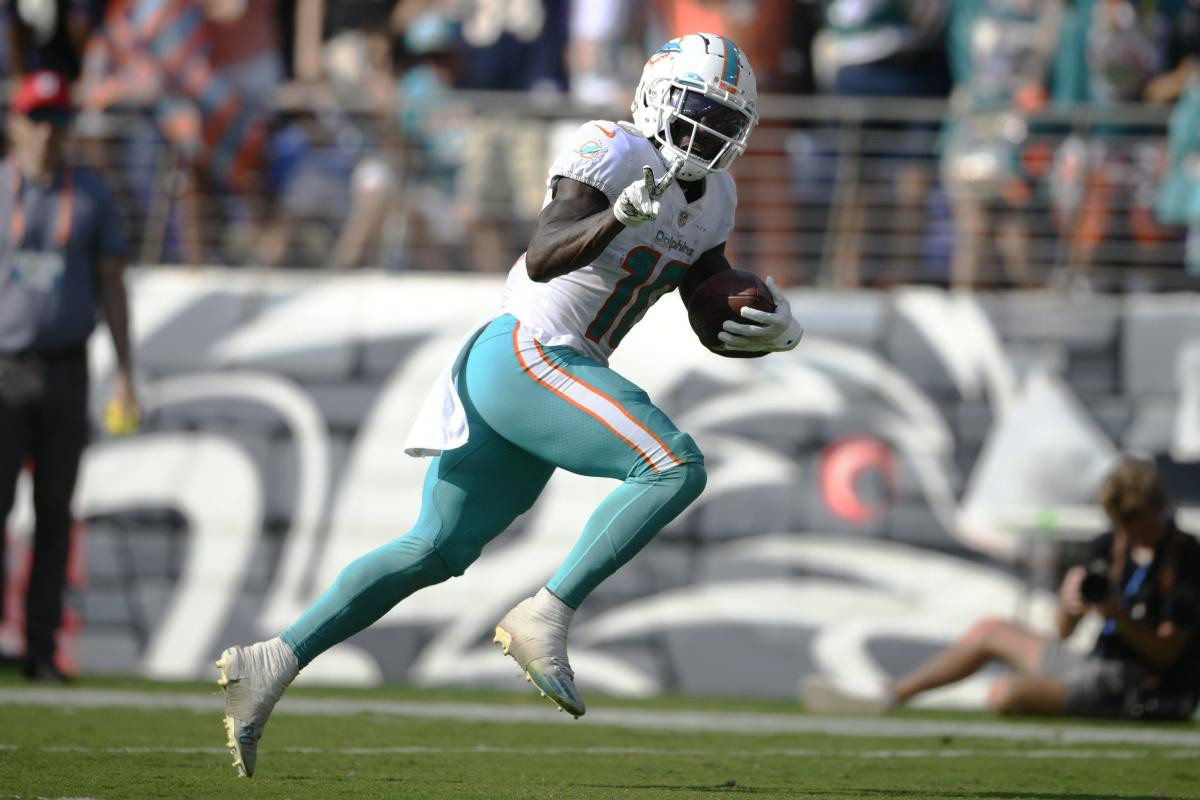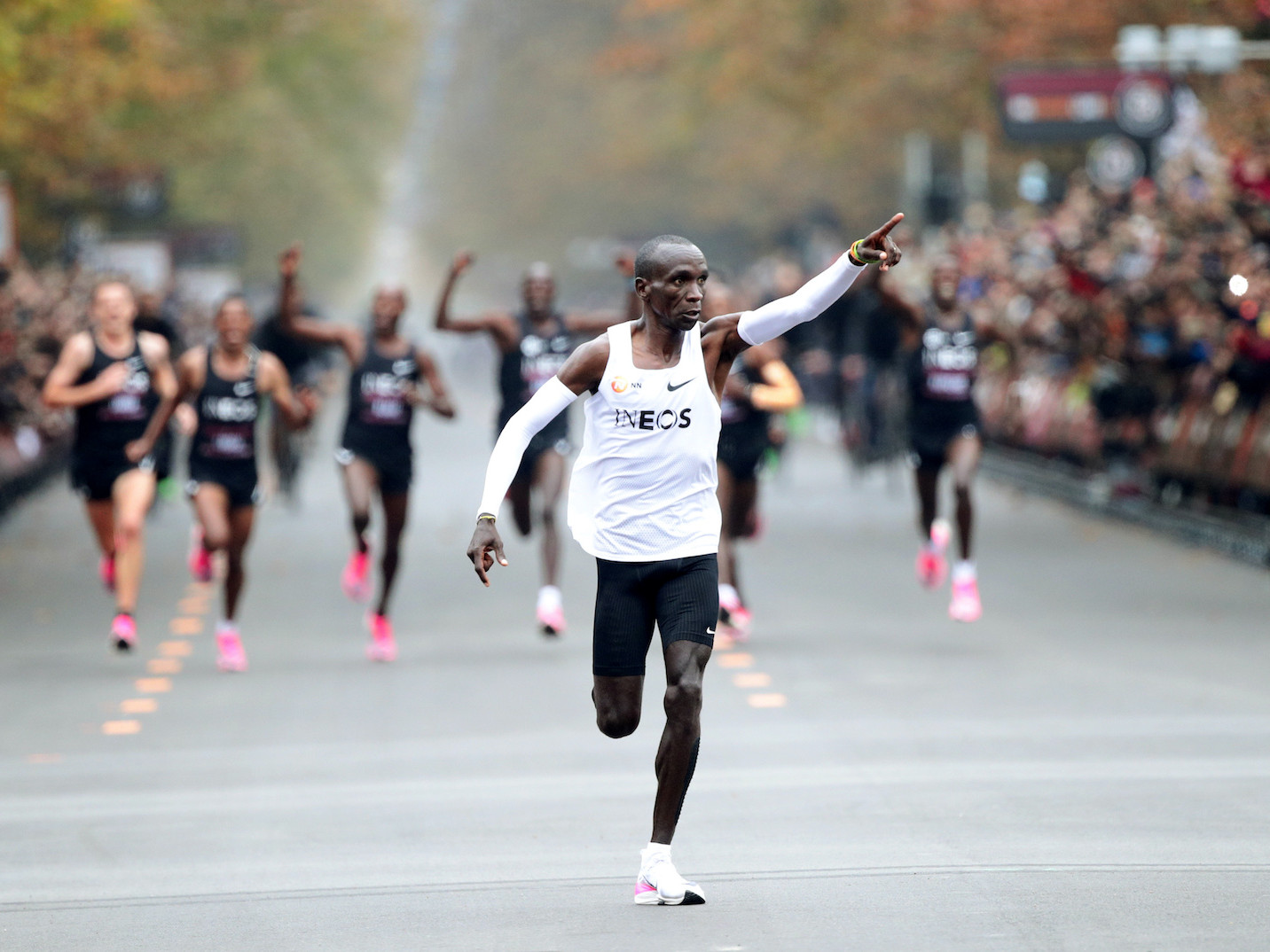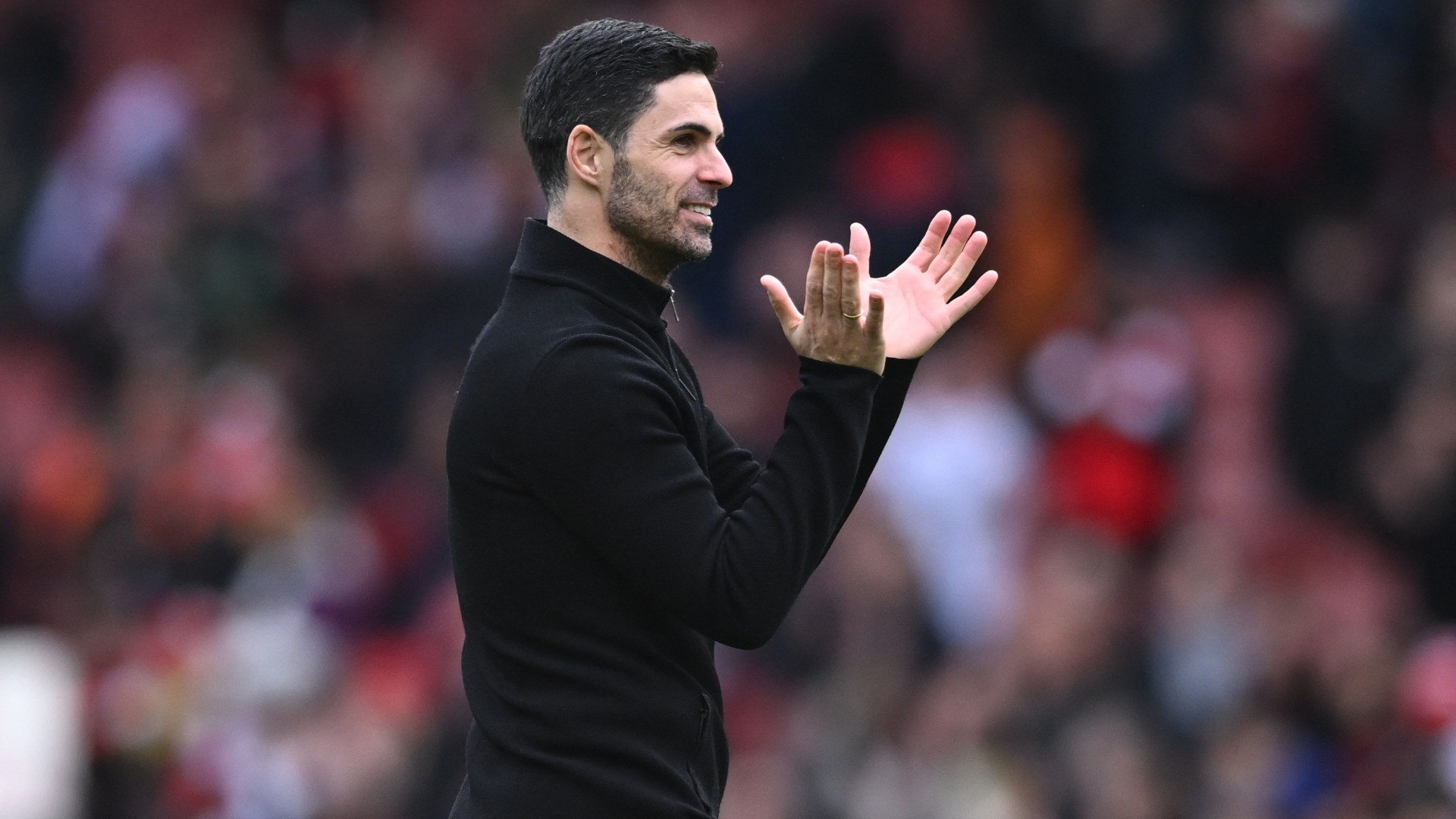Gold is Gabby's, at last.
Gabby Thomas surged to victory in the women's 200m final on Tuesday night in Paris, winning wire-to-wire in 21.83 seconds. In the process, she has claimed her Olympic gold medal. Thomas led from the gun and finished with daylight between her and silver medalist Julien Alfred of Saint Lucia, who won 100m gold on Saturday.
“I’m really in disbelief because having an Olympic gold medal is something in my wildest dreams,” Thomas said. “But at the same time I know how hard I’ve fought for it. This has been six years in the making, head down, working hard.
This is the happiest moment of my life.
Thomas is joined on the medal podium by U.S. teammate Brittany Brown, who earned bronze for her first Olympic medal. Brown entered Paris with only one world medal (a silver from 2019 Worlds), and her 22.20-second dash around the purple Stade de France track has now added an Olympic bronze to her docket.
For the race's emphatic victor, Thomas, this win comes after a string of falling short of gold in major title races. At the Tokyo Olympics, she took bronze. In her next big-ticket race, 2023 Worlds, it was a silver. Now in Paris, she's got her gold.
From the moment she landed in the City of Light, Thomas was the clear woman to beat. The withdrawal of Jamaican rival Shericka Jackson only ballooned that target.
“There’s definitely some added pressure going into this Olympics,” Thomas told NBC Olympics. “Once you’ve already had success, people are kind of waiting for you to mess up.”
With expectations fully mounted, Thomas didn’t mess up — not even close. From the moment the starting pistol was fired, she was in charge.
“I just knew that I had it,” she said moments after her gold-winning run. “It was a confidence that you can’t really describe. Of course there was pressure, but I felt confident.”
The Paris Olympic title secures the 14th gold medal for the U.S. in the Olympic women's 200m, which breaks a 13-13 tie with Jamaica for the most in history (no Jamaican earned a 200m medal this year for the first time since 1976). And Thomas is the first American since Allyson Felix in 2012 to strike gold in the women's event.
The 27-year-old has endeared herself to the American public not just with her command of the track, but also with her extraordinary public health work. She volunteers weekly at a Volunteer Healthcare Clinic (VHC) in Austin, Texas, which provides primary care to children and adults without access to such care.
“A lot of people can say they want to do things, but Gabby is actually doing this work at a high level,” said the clinic's Director of Volunteer Services, Laura Hurst. “I don’t think you can underestimate the power of what one person can do.”
With a Harvard degree in neurobiology and global health, plus a master’s in epidemiology from the University of Texas, Thomas is a safe bet to impact public health for decades after she stops running professionally.
“It's so fulfilling because we're actually making a direct impact and these are people who really do have a need for healthcare,” Thomas said.
As she has volunteered her time, Thomas has remained “laser-focused” on her on-track mission: 200m Olympic gold. In the spring, she briefly flirted with the idea of contesting the 400m at U.S. Trials. But when decision time came, Thomas elected to stick with the 200m: “My goal is to focus on the 200, and to get the gold in the 200 meters.”
Thomas' subsequent dominance at Trials, where she posted a world-leading 21.78, sent her to Olympics No. 2. Now, she has made good on the gold goal.
“You prepare for this moment and train so hard for this moment,” Thomas said. “But when it actually comes, it's indescribable.”
Thomas is a woman of many titles — Harvard grad, healthcare worker, maybe even future doctor — and now, she's earned the once-evasive designation of Olympic champion.
ST. DENIS, France – Gabby Thomas couldn’t recall the 200 meters she ran before she became an Olympic gold medalist.
“I actually blacked out for the race,” Thomas, the 27-year-old Massachusetts native, began. “...It’s the most bizarre feeling when you get into a flow and you get into that energy where nothing else matters but the finish line. As far as I was concerned, I was the only one in that race.”
The race was never close. Thomas fought Saint Lucia’s Julien Alfred and Great Britain’s Dina Asher-Smith for the first quarter of the race, but never had a contender through the latter half. She took the lead 80m into the race and didn’t relinquish it as she strode strongly off the bend, decidedly in the lead.
Thomas, who chose to forego her final year of NCAA eligibility at Harvard in 2018 in order to turn pro, still earned her degree in neurobiology in 2019. She was inspired to study neurobiology by her brothers, Desi and Andrew. Desi has autism and Andrew, Thomas’s twin, went to neuro-feedback therapy for ADHD in high school.
She wasn’t done with school in 2019, however, as she continued to value education as a way to build herself beyond running. She completed her Master’s Degree in Epidemiology in 2023 at the University of Texas, where Thomas resides to train with the Austin-based Buford-Bailey Track Club.
Thomas’ gold medal win in Paris makes her the first Harvard graduate to earn a gold medal in a track and field event. She also has two medals from the Tokyo 2020 Olympic Games – a silver from the 4x100m relay and a bronze from the 200m. Her podium finish here gives Thomas her third Olympic medal.
Thomas has a real shot at a world record within her career. She’s the fastest 200m runner since the world record holder, Florence Griffith-Joyner, set the mark of 21.34 seconds in 1988. Thomas’s 200m race in the U.S. Olympic trials in 2021 was 21.60 – the second-fastest time ever run by a woman in the 200m. Her time to win gold on Tuesday was 21.83.
She crossed the line with eyes closed and both hands on her head, the magnitude of Olympic gold just beginning to settle in.
Winning Olympic gold meant defeating the recently crowned 100m champion lurking in lane eight – Alfred. Alfred took silver on Tuesday, but was the world’s fourth-best 200m runner entering the race with a personal best time of 21.86 seconds. All 200m finalists boasted a sub-22 second personal best except two – Ivory Coast’s Jessika Gbai and Great Britain’s Daryll Neita.
USA’s Brittany Brown broke through the 22-second barrier and ran her personal best of 21.90 seconds during U.S. Olympic Trials in late June. Brown rode that wave all the way to the Olympic 200m final in Paris, where she sprinted into a bronze medal finish.
“It has been a long journey to get back on the track, to get back training,” Brown said. “Coming back from injury last year, it was very, very hard.”
Brown worked through a sports hernia that kept her off the track until February of this year.
“I think sometimes when athletes have injuries, it's like a mental game that you're playing with yourself,” Brown said. “How am I going to get back? You know, it’s an Olympic year and I missed two, three months of training. Like is it actually going to happen?”
For Brown, it finally did. The bronze medalist out-leaned Asher-Smith for third place, running her 200m in 22.20, just two hundredths of a second faster than Asher-Smith’s 22.22.
“I'm just so grateful that I can be a vessel,” Brown said through tears. “I'm so grateful I can be here and be in this moment…It's hard when life is hard. It's hard when you deal with injuries and it feels like no one's looking at you...It's not about me. It's about my team. It's about people who look like me who go through stuff like me.”
The two sprint stars ended their nights wrapped in the Stars and Stripes – both with flags draped over their shoulders, and the approval of the American fans populating the crowd at Stade de France cascading down the grandstands to meet them in their victory.
SAINT-DENIS, France — Stardom, and its levels, is a wholly intangible phenomenon. It’s unwritten but understood. It’s unofficial yet incredibly significant. It’s a measurement of adoration without a universal metric system.
But whatever the rubric used, whatever credentials are necessary, whatever contexts and extras factor in, Gabby Thomas is qualified.
Tuesday, she checked the final box to complete her resume. She came off the turn in the women’s 200-meter final looking to obliterate. She ran with the kind of power that comes from having to fight for everything. She made the race of her life look easy. Even her time of 21.83 seconds doesn’t illustrate her dominance.
Thomas had a point to prove, and she did it in prime time at Stade de France. She won gold. Her application for the position of superstar in her sport has been submitted.
There will be no more overlooking Gabrielle Lisa Thomas. No more denying her belonging with the best of American track.
This was not a star being born. This was a blossoming. This was a culmination.
Thomas has been methodically and consistently growing into an Olympic champion. This moment was prepared for with attention to detail and diligence. If she seems ideal for the role of marquee athlete, it’s because she’s been marinating, slow-cooking to perfection.
She knows who she is and who she wants to be. She knows why she’s here. She knows what she wants to do. She’s put in the work, maximizing her talent.
She’s accumulated experience. She’s grown from a heart-warming story at the Tokyo Olympics to being ranked No. 2 in the world and being the hunted. She’s grown comfortable in the pressure cooker. She’s been patient, waiting for her time, not skipping steps.
Now she’s a gold medalist, and not the least bit shy about declaring what should be coming her way.
“I am ready,” she said. “I’ve had years of experience now. I’m a mature athlete. I can handle the pressure. And, I’ve proven myself. I am ready and I am excited about it.”
She’s also not wrong.
Who’s more worthy than Thomas? She has an Olympic gold and an Olympic bronze medal in the 200 meters, plus a silver in the 4×100 meter relay. She has a silver medal from the women’s 200 at the 2023 World Championships, and a gold medal at the same event in the 4×100 relay. That’s five medals.
Tuesday’s 200-meter final was just the latest example of how she rises to moments. The only thing missing from the spectacle at Stade de France was Jamaican Shericka Jackson, ranked No. 1 in the world in the 200 and owner of the discipline’s fastest times this side of Florence Griffith-Joyner.
Jackson pulled out of her best event, leaving 100-meter champion Julien Alfred of Saint Lucia as Thomas’ biggest foe.
But she wasn’t in Thomas’ league. Not on this night. And Jackson might not have been either.
“I was confident before that,” Thomas said of Jackson’s withdrawal, “and I was confident going into this race.”
Who’s more inspiring than Thomas? Raised by a single mother who worked her tail off to provide for her children and become a professor, Thomas has work ethic in her DNA.
And working is how you graduate from Harvard with a degree in neurobiology then get a master’s degree from the University of Texas in public health with a concentration on epidemiology. And dominate in track and field. Her day job is volunteering at a health care clinic. Her passion outside of sport is addressing inequities in healthcare.
“I would say she’s the female that needs to be in front of the track world,” said McKenzie Long, the recent Ole Miss graduate — who has four degrees herself — who finished seventh in her first Olympic final. “She’s that type of female that everybody should look up to and want to be like.”
Off the track, Thomas is as marketable as they come, as much as she’s willing to take advantage. With diverse interests and talents, and an impressive background story, she’s an easy endorser. She’s one of the faces of New Balance. She pushes Sephora. She’s the face of Alexis Ohanian’s new women’s track event ATHLOS.
On the track, Thomas is a bully. Alfred felt Thomas on Tuesday.
She needed to be either well ahead of Thomas on the turn, or pace herself and press a nitro button down the stretch. But either is hard to do against Thomas. She is fast enough to attack the first 100 meters, when the speedsters might want to save some energy, and put pressure on her opponents to keep up. She doesn’t let you conserve.
Then for the final 100 meters, she’s strong enough to have plenty in the tank down the stretch, those long strides swallowing up the track. Alfred, like many others, didn’t have enough to do both. Thomas led out of the turn and the force was apparent.
Thomas’ top-end speed doesn’t rival 100-meter sprinters. But the 200 is about speed and endurance. It’s about how long you can be fast.
“She’s strong,” Alfred said, her soft voice turning up an octave for emphasis. “She’s a very strong athlete mentally and physically.”
It’s usually surprising to people when they come to see Thomas’ toughness. It’s not the first impression she gives. Thomas’ smile, intentionally or not, is a crafty misdirection. Most see a pretty face, a cheery personality, hear about the Harvard connection, and presume she’s not a beast.
The assumption is that she’s not a beast. Thomas loves ruining that perception.
The truth is, Thomas was no prodigy. She didn’t go to some big track school. She ran from Harvard to Tokyo to Paris. She wasn’t expected to be a significant player in this sport. She didn’t come into the game, or rise within it, to much fanfare. Nothing was bequeathed to her sheerly on her promise.
Nah. She took this. She doesn’t have to do this — and at one point said she wanted to quit running professionally. She could be on the marquee of a hospital instead of track event. She could sit on health boards instead of posing for billboards.
But she decided she wanted this. She set her sights on it and grinded for it.
“This is years in the making,” she said. “People don’t really see what goes on behind the scenes and how hard we work.”
The only thing missing on her resume, the only remotely valid justification for limiting her fame and earnings and platform and reach was that she didn’t have a gold medal. So she made her way to the biggest stage of her life and got one. That’s what superstars do.
(Photo: Steph Chambers / Getty Images)




